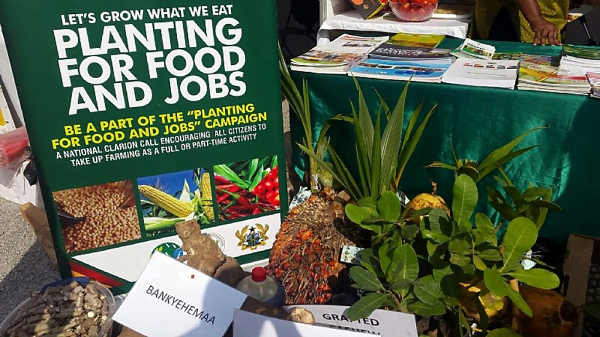An Agriculture Policy Consultant, Emmanuel Wullo Wullingdool has expressed some level of concern about how the government’s Planting for Food and Jobs (PFJ) policy has been implemented. Emmanuel Wullingdool believes that the PFJ policy was not implemented based on the 5 pillars as suggested by the Ministry of Food and Agriculture.
According to Mr. Wullingdool, PFJ has a total of five pillars. This includes marketing; a component that’s been missing since the inception of the programme.
The Agric Consultant raised the concern against the backdrop of the Ministry of Food and Agriculture’s PFJ Market; a food retail centre at the Ministry’s premises in Accra, the national capital. The open air market is to help increase food availability and help fight profiteering by traders.
He spoke on A1 Radio’s Day Break Upper East Show today, Wednesday, November 16, 2022.
“If you look at it, the market is one of the components of the PFJ programme. My impression is that, it means that the policy in totality has not delivered on all that it was set to do, especially on the element of marketing.”
“Ensuring that what is produced reaches the final consumer and what the ministry is currently doing points to the fact that it [the PFJ] has not achieved that purpose.”
Mr. Wullingdool noted that it is important the program addresses the issues of market which is a concern for farmers as well as storage facilities.
Background
The Ministry of Food and Agriculture (MOFA) has set up food retail centres in the Greater Accra Region to mitigate the hike in food prices.
According to the Minister of Food and Agriculture, Dr. Owusu Afriyie Akoto, most middlemen go to the farm gates for farm produce at cheaper prices, only to turn around and sell them at higher prices in urban centres, hence the need for the MOFA retail centres.
Food prices in the country continue to soar, raising concerns about the government’s failed interventions in the Agricultural sector.
Data from the Ghana Statistical Service (GSS) reveal that food inflation in May 2022 was 30.1 percent higher, compared with 26.6 percent in the preceding month.
Non-food Inflation was also 25.7 percent in May 2022, as against 21.3 percent the previous month.
Speaking in an interview in Sunyani, the Minister of Food and Agriculture, Dr. Owusu Afriyie Akoto, attributed the increases to factors beyond government’s control, such as high cost of fertiliser and chemicals and the increase in fuel prices.
He said despite the ongoing economic crisis, some people have drastically increased their food prices which he says is unacceptable.
Source:A1Radioonline.Com|101.1MHZ|David Azure |Bolgatanga|


